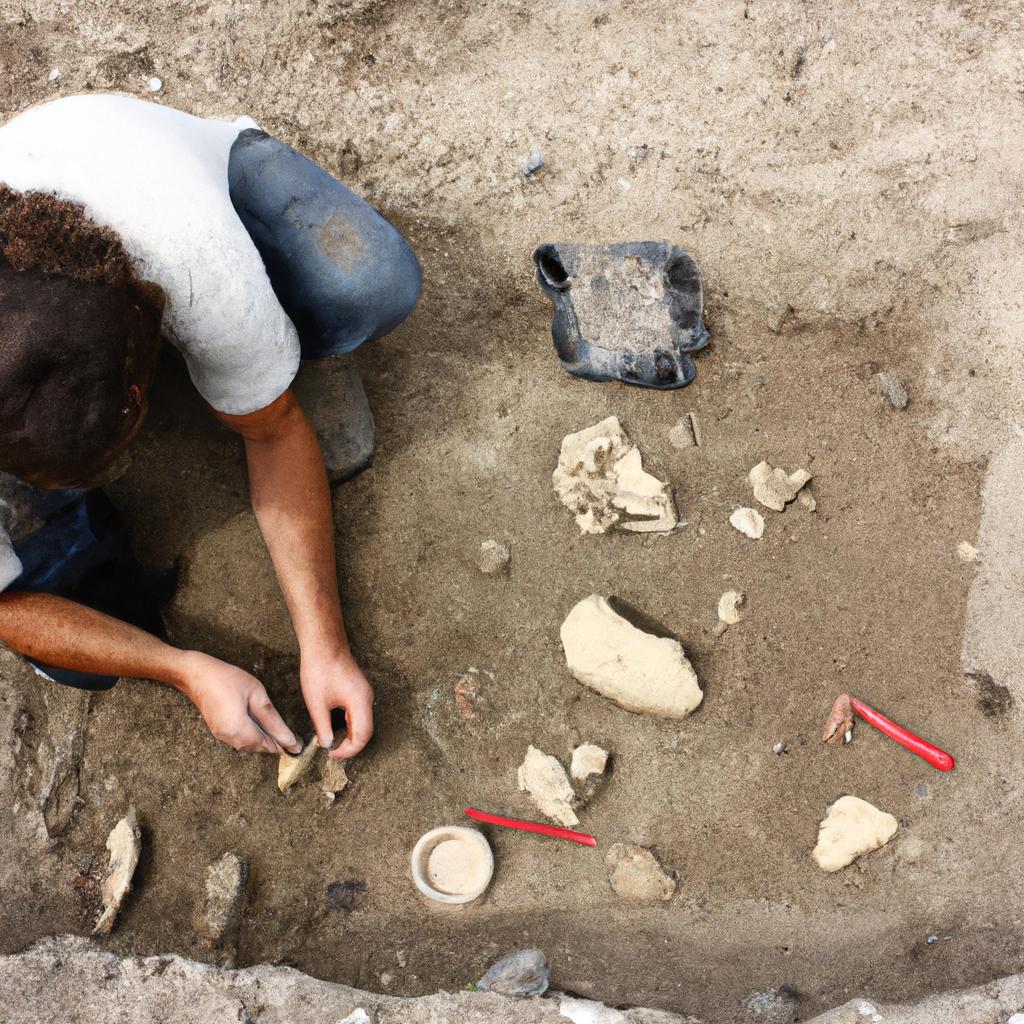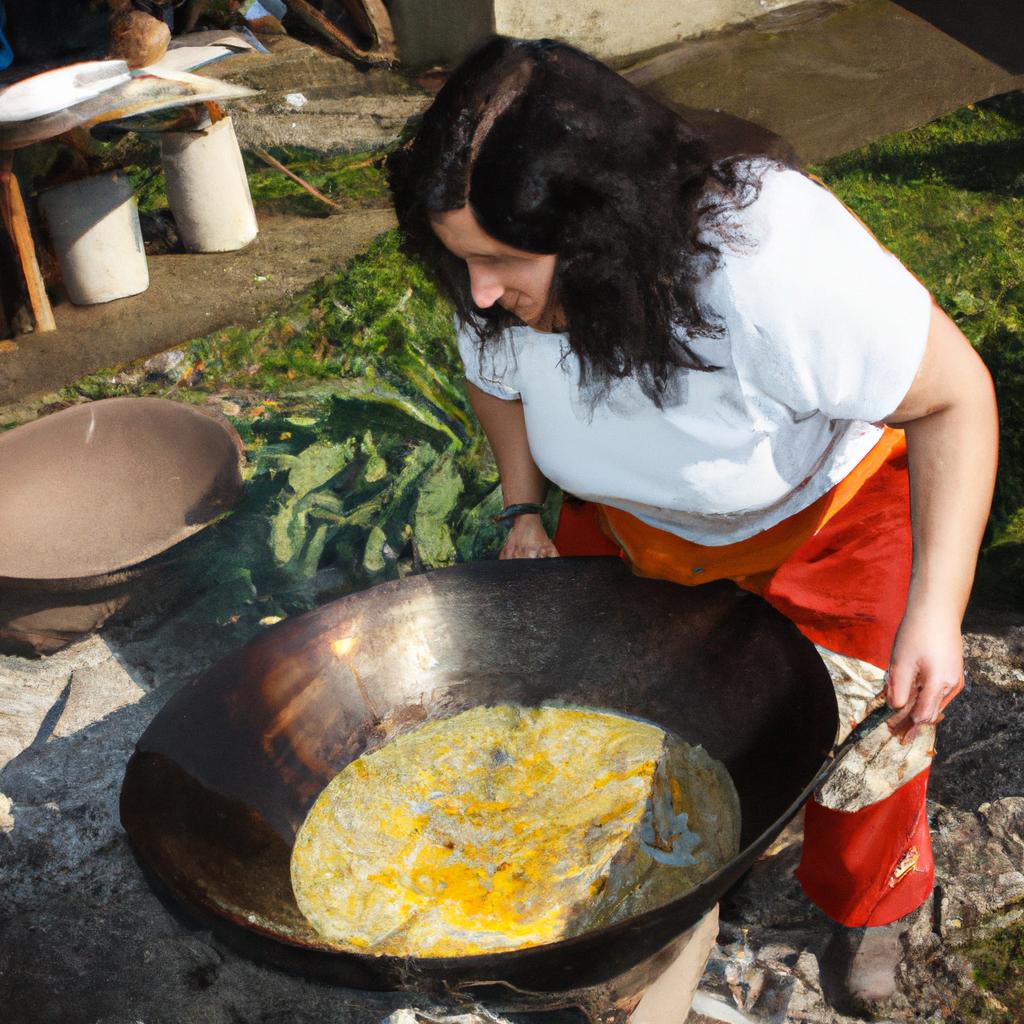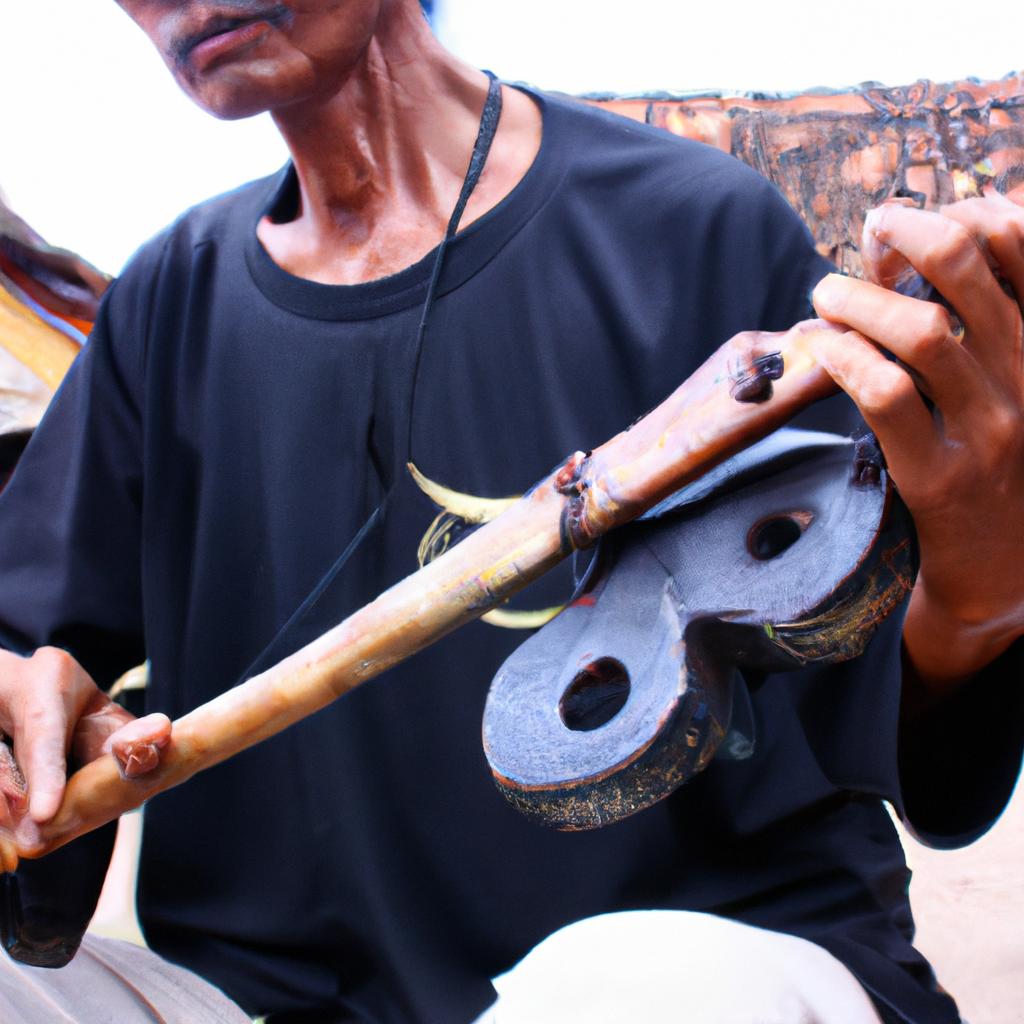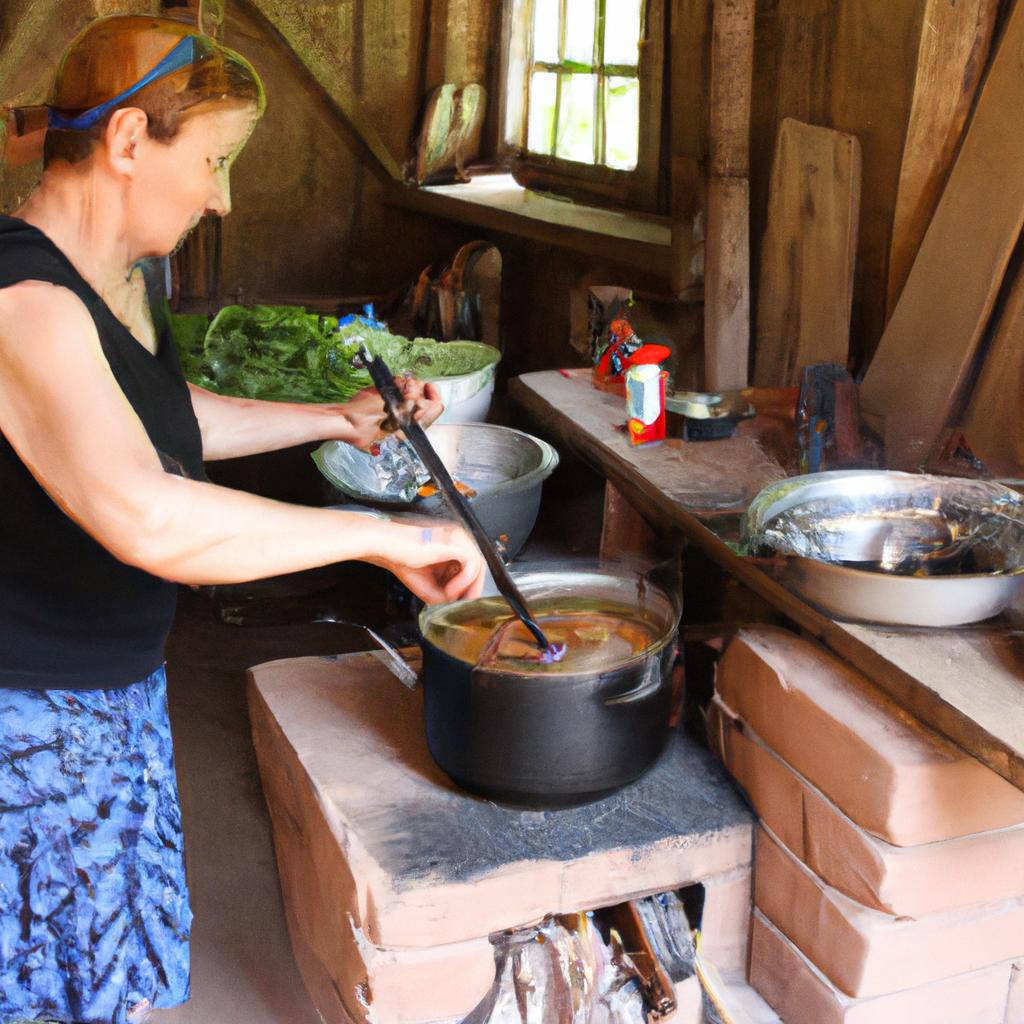Artisan workshops in rural accommodations have emerged as a means to unlock cultural experiences for travelers. These immersive experiences offer the opportunity for tourists to engage with local craftspeople and gain insights into traditional skills and techniques. For instance, at a hypothetical artisan workshop in Cangas de Onas, visitors can witness the intricate process of pottery making firsthand, from shaping clay on a potter’s wheel to decorating and firing the finished pieces. Such interactions not only promote cultural exchange but also contribute to the preservation of traditional craftsmanship.
The concept of integrating artisan workshops within rural accommodations has gained momentum due to its potential benefits for both hosts and guests. By offering these unique experiences, accommodations are able to differentiate themselves from standard tourist offerings, attracting culturally curious travelers seeking authentic encounters. Moreover, artisans residing in rural areas benefit from increased exposure and opportunities to showcase their craftmanship. This symbiotic relationship between accommodation providers and local craftsmen fosters community development by generating income, promoting entrepreneurship, and preserving intangible cultural heritage.
In this article, we will explore how artisan workshops in rural accommodations in Cangas de Onas provide an avenue for unlocking rich cultural experiences for tourists while simultaneously supporting local craftsmen. We will examine the impact of such initiatives on tourism development, economic sustainability, and cultural preservation in the region.
One of the key impacts of integrating artisan workshops within rural accommodations is the enhancement of tourism development. By offering immersive experiences that allow travelers to engage with local craftspeople, these accommodations attract a niche market of culturally curious tourists who are seeking authentic and meaningful experiences. This not only diversifies the tourism offerings in Cangas de Onas but also extends the duration of visitors’ stays as they spend more time participating in workshops and exploring the local culture. As a result, this contributes to increased tourist spending, stimulates the local economy, and supports job creation.
Moreover, these initiatives promote economic sustainability by providing income opportunities for local artisans. In many rural areas, traditional craftsmanship may be at risk of diminishing due to lack of demand or alternative livelihood options. However, by integrating artisan workshops into accommodations, craftsmen are given a platform to showcase their skills and sell their products directly to visitors. This generates additional income for them and encourages entrepreneurship within the community. The revenue generated from these activities can then be reinvested into preserving and promoting traditional craftsmanship.
Furthermore, artisan workshops in rural accommodations play a crucial role in preserving intangible cultural heritage. Traditional crafts like pottery-making often carry deep historical and cultural significance that can be passed down through generations. By providing a space for artisans to practice their craft and share their knowledge with visitors, these workshops contribute to the transmission and preservation of traditional skills and techniques. This helps prevent the erosion of cultural practices over time while fostering pride and appreciation for local heritage among both residents and tourists.
In conclusion, artisan workshops integrated within rural accommodations offer a unique avenue for unlocking rich cultural experiences for tourists while simultaneously supporting local craftsmen in Cangas de Onas. These initiatives have positive impacts on tourism development by attracting culturally curious travelers and extending their length of stay. They also contribute to economic sustainability by generating income opportunities for artisans and stimulating entrepreneurship within the community. Additionally, these workshops play a vital role in preserving intangible cultural heritage by providing a platform for the transmission and promotion of traditional craftsmanship. Overall, the integration of artisan workshops within rural accommodations is a win-win situation that benefits both hosts and guests while contributing to the preservation of local culture and community development.
The History of Artisan Workshops in Cangas de Onas
Artisan workshops in Cangas de Onas have a rich and vibrant history that dates back several centuries. These workshops are deeply rooted in the cultural fabric of the region, providing valuable insights into the traditional craftsmanship that has been passed down through generations. To illustrate this point, let us consider the case study of Juan Martinez, a skilled potter who inherited his craft from his father and grandfather.
One significant aspect of these artisan workshops is their ability to evoke an emotional response in both locals and visitors alike. The unique blend of tradition, skill, and creativity found within these workshops creates an atmosphere where one can truly appreciate the beauty and value of handmade crafts. This emotional connection is further enhanced by the sense of community fostered within these spaces, as artisans often come together to share techniques, knowledge, and stories with each other.
To fully grasp the significance of artisan workshops in Cangas de Onas, it is important to delve into some key elements that contribute to their cultural impact:
- Preservation of heritage: Through their dedication to traditional craftsmanship, these workshops play a vital role in preserving local heritage. They act as custodians of ancient techniques and skills that might otherwise be lost or forgotten.
- Economic sustainability: The presence of artisan workshops provides economic opportunities for individuals who may not have access to mainstream employment options. By supporting local artisans, communities can create sustainable sources of income while also promoting tourism and attracting visitors interested in authentic cultural experiences.
- Cultural exchange: Artisans often welcome curious travelers into their workshops, allowing them to witness firsthand the creative process behind their work. This interaction fosters meaningful cross-cultural exchanges and promotes understanding between different communities.
- Sense of pride: For many artisans and residents alike, these workshops instill a deep sense of pride in their cultural heritage. The products crafted here serve as tangible representations of local traditions and values.
In exploring the history and significance of artisan workshops in Cangas de Onas, it becomes evident that these spaces are more than just places where crafts are made. They serve as living embodiments of cultural heritage, nurturing traditions while also adapting to contemporary influences. With this understanding, we can now delve into the role of rural accommodation in preserving these artisan traditions.
The Role of Rural Accommodation in Preserving Artisan Traditions
Artisan workshops in Cangas de Onas have a rich history deeply rooted in the local culture. These workshops play a significant role in preserving traditional artisanal crafts and techniques, ensuring their continuity for future generations. Moreover, rural accommodations within this region have become instrumental in unlocking unique cultural experiences for visitors seeking an immersive encounter with these age-old traditions.
To illustrate the impact of artisan workshops and rural accommodations on cultural preservation, let us consider the case study of Maria’s Pottery Studio. Located amidst the picturesque countryside of Cangas de Onas, Maria’s studio showcases her mastery of pottery-making techniques handed down through generations. Visitors who choose to stay at nearby rural accommodations are not only provided with comfortable lodging but also gain exclusive access to hands-on pottery classes conducted by Maria herself. This direct involvement allows tourists to appreciate the intricacies involved in creating beautiful ceramic pieces while fostering an appreciation for the art form.
The integration of artisan workshops into rural accommodation offerings serves as a catalyst for promoting sustainable tourism practices and contributing to community development. By incorporating such initiatives, destinations like Cangas de Onas can preserve their cultural heritage while simultaneously generating income opportunities for local artisans. This symbiotic relationship ensures that traditional craftsmanship remains relevant and economically viable, safeguarding against its potential decline due to changing societal needs or economic pressures.
Embracing these culturally immersive experiences can evoke various emotions among visitors:
- A sense of wonder: Witnessing skilled artisans transform raw materials into exquisite works of art instills awe and admiration.
- Connection with tradition: Engaging directly with craft practitioners fosters a deeper understanding and connection with ancestral customs.
- Appreciation for authenticity: Experiencing firsthand how time-honored techniques are still employed today highlights the value placed on authentic craftsmanship.
- Nurturing creativity: Participating in interactive workshops empowers individuals to express their own creativity while learning from seasoned artisans.
This emotional engagement is further enhanced when considering testimonials from previous visitors, as illustrated in the following table:
| Visitor | Testimonial |
|---|---|
| John | “My stay at Maria’s studio was truly enlightening. I never knew pottery-making could be so captivating!” |
| Sarah | “The immersive experience of learning traditional craft techniques has left a lasting impression on me. Highly recommended!” |
| Emma | “I felt transported back in time when observing skilled artisans working meticulously to create stunning pieces. Unforgettable!” |
In conclusion, artisan workshops integrated within rural accommodations offer an unparalleled opportunity for travelers to unlock cultural experiences and actively contribute to preserving traditional crafts in Cangas de Onas. These immersive encounters evoke emotions of wonder, connection with tradition, appreciation for authenticity, and nurturing creativity among visitors. By embracing such initiatives, tourists can forge a deeper understanding of local heritage while supporting sustainable tourism practices that positively impact both the community and individual travelers.
Transitioning into the subsequent section exploring different types of artisan workshops in Cangas de Onas, let us now delve into the diverse range of crafts awaiting discovery within this enchanting region.
Exploring the Different Types of Artisan Workshops in Cangas de Onas
Section 3: Exploring the Different Types of Artisan Workshops in Cangas de Onas
Building upon the role rural accommodation plays in preserving artisan traditions, it is crucial to explore the diverse types of workshops available in Cangas de Onas. By doing so, visitors can gain a deeper understanding of the cultural heritage embedded within this region. One such example is the pottery workshop hosted by local artist Maria Lopez.
Maria’s workshop offers an immersive experience where participants have the opportunity to learn traditional pottery techniques passed down through generations. Under her guidance, guests can mold clay into beautiful works of art while learning about the historical significance and symbolism behind each design. This hands-on approach allows individuals to forge a personal connection with their creations, fostering a sense of pride and appreciation for these ancient crafts.
- Leatherworking – Participants can discover the meticulous process of transforming raw leather into exquisite handmade goods.
- Weaving – Visitors can engage in weaving workshops that showcase age-old textile traditions still practiced today.
- Blacksmithing – Those interested in metalworking can try their hand at forging intricate ironworks under expert supervision.
- Woodcarving – The artistry behind woodcarving comes alive as participants delve into this centuries-old craft.
In addition to these workshops, there are numerous other opportunities for travelers to immerse themselves fully in artisanal experiences throughout Cangas de Onas. To give readers a comprehensive overview, here is a table showcasing various forms of craftsmanship found within this region:
| Craft Type | Description | Materials Used |
|---|---|---|
| Pottery | Handmade ceramics adorned with unique designs | Clay |
| Textiles | Intricate woven fabrics featuring traditional patterns | Wool, cotton |
| Metalwork | Artistic ironworks crafted with precision and skill | Iron |
| Leather Goods | Handcrafted leather products such as bags and belts | Leather |
By offering an array of artisan workshops and experiences, Cangas de Onas ensures that visitors can explore a diverse range of crafts deeply rooted in its cultural heritage. Engaging in these immersive activities not only allows individuals to acquire new skills but also fosters a sense of connection, appreciation, and respect for the timeless traditions upheld within this region.
As we delve into the benefits of participating in artisan workshops, it becomes evident how these hands-on experiences contribute to personal growth and cultural preservation.
The Benefits of Participating in Artisan Workshops
Exploring the different types of artisan workshops available in Cangas de Onas provides a unique opportunity for visitors to immerse themselves in the local culture and learn traditional crafts. One such workshop is “La Casa del Telar,” where participants can engage in hands-on weaving experiences guided by skilled artisans. For instance, Maria, a tourist from Madrid, had the chance to spend a day at La Casa del Telar and was able to create her own woven tapestry under the guidance of an experienced weaver.
Participating in these artisan workshops offers various benefits that extend beyond simply acquiring new skills. Let us delve into some of these advantages:
- Cultural Preservation: Artisan workshops play a crucial role in preserving cultural heritage by passing down traditional techniques and knowledge from one generation to another.
- Authentic Experiences: Engaging with artisans allows visitors to experience firsthand the authentic ways of rural life in Cangas de Onas, fostering a deeper understanding and appreciation for local traditions.
- Connecting with Local Community: Through interactions with artisans, participants have the opportunity to connect with members of the local community, forging meaningful relationships and gaining insights into their way of life.
- Promoting Sustainable Tourism: By supporting artisan workshops, tourists contribute directly to the sustainability of the region’s economy while also encouraging responsible tourism practices.
To further illustrate how participating in these workshops can unlock cultural experiences, consider the following table showcasing some popular artisan activities offered in Cangas de Onas:
| Workshop | Activity | Duration | Cost (per person) |
|---|---|---|---|
| La Casa del Telar | Weaving | Half-day | €45 |
| Taller de Cerámica | Pottery making | Full-day | €60 |
| Escuela de Alfarería | Traditional pottery techniques | 2 days | €100 |
| Taller de Cuero | Leathercraft | Half-day | €40 |
As evident from the table, there is a diverse range of workshops available, catering to various interests and time constraints. These interactive experiences enable participants to engage with skilled artisans while learning about local traditions and crafts.
In summary, participating in artisan workshops in Cangas de Onas offers visitors an opportunity to unlock cultural experiences that go beyond acquiring new skills. By preserving cultural heritage, fostering authentic interactions, connecting with the local community, and promoting sustainable tourism, these workshops contribute significantly to enhancing one’s understanding and appreciation of the region’s rich cultural heritage.
Transitioning into the subsequent section on “How Artisan Workshops Contribute to the Local Economy,” it is essential to recognize how these immersive experiences not only benefit individuals but also have broader implications for the community as a whole.
How Artisan Workshops Contribute to the Local Economy
Unlocking Cultural Experiences Through Artisan Workshops
Building upon the previous section on the benefits of participating in artisan workshops, let us now delve into how these workshops contribute to unlocking cultural experiences for visitors in Cangas de Onas. To illustrate this, consider the following hypothetical case study: Maria, a tourist visiting from abroad, decides to stay at a rural accommodation that offers artisan workshops during her vacation.
First and foremost, artisan workshops provide an immersive experience where individuals can actively engage with local artisans and gain firsthand knowledge about traditional crafts. In Maria’s case, she chose to participate in a pottery workshop led by a skilled ceramic artist. By observing and interacting with the artist, Maria not only learned about the techniques involved but also gained insights into the historical significance of pottery in the region. This hands-on approach allows visitors like Maria to connect more deeply with local culture and heritage.
Furthermore, artisan workshops offer opportunities for cross-cultural exchange and dialogue between locals and tourists. As participants work alongside artisans, they have ample chances to ask questions, share stories, and develop personal connections. These interactions foster mutual understanding and appreciation of diverse perspectives. For instance, during her time at the pottery workshop, Maria met other participants from different countries who shared their own artistic traditions. Through these conversations, she broadened her horizons and developed new friendships based on a shared passion for craftsmanship.
In addition to fostering cultural exchange, engaging in artisan workshops supports the preservation of traditional skills and crafts within communities. By booking these experiences through rural accommodations, tourists directly contribute to the economic sustainability of local artisans while simultaneously supporting wider community development initiatives. The table below highlights some key ways in which artisan workshops benefit both locals and visitors:
| Benefits for Locals | Benefits for Visitors |
|---|---|
| Preservation of traditional skills | Immersive cultural experience |
| Economic empowerment | Learning practical craft techniques |
| Promotion of regional identity | Cross-cultural exchange |
| Community development | Personal connection with artisans |
In conclusion, artisan workshops in rural accommodations offer visitors like Maria the opportunity to unlock cultural experiences that go beyond mere observation. Through active participation, cross-cultural dialogue, and economic support for local artisans, these workshops become a gateway to understanding the rich heritage of Cangas de Onas. Now that we have explored the benefits and cultural significance of artisan workshops, let us move on to discussing some tips for booking an extraordinary workshop experience in the next section.
Tips for Booking an Artisan Workshop Experience in Cangas de Onas
Tips for Booking an Artisan Workshop Experience in Cangas de Onas
Transitioning from the previous section that highlighted how artisan workshops contribute to the local economy, this section will delve into practical tips for booking an artisan workshop experience in Cangas de Onas. By following these recommendations, travelers can ensure a seamless and enriching cultural encounter.
When considering taking part in an artisan workshop during their stay in Cangas de Onas, visitors should begin by researching the available options. A wide range of crafts are practiced in the area, including pottery making, basket weaving, wood carving, and traditional textile production. For instance, let’s take a hypothetical case study: Maria is interested in learning about traditional pottery techniques specific to the region. She discovers several local artisans offering workshops where she can gain hands-on experience with clay molding and glazing processes.
Once potential workshops have been identified, it is important to consider certain factors before making a final decision:
- Workshop duration: Check if the workshop aligns with your schedule and desired level of engagement.
- Group size: Determine whether you prefer one-on-one instruction or enjoy working alongside other participants.
- Language requirements: Confirm if language barriers may hinder effective communication during the workshop.
- Cost and included materials: Evaluate pricing structures and inquire about any additional expenses such as materials fees.
To better illustrate these considerations visually:
| Considerations | Questions to Ask |
|---|---|
| Workshop Duration | – How long does the workshop last? – Is there flexibility regarding scheduling? |
| Group Size | – Will I be participating alone or with others?- What is the maximum number of participants per session? |
| Language Requirements | – Does the instructor speak my preferred language?- Are translation services available if needed? |
| Cost and Materials | – What is the total cost of participation?- Are all necessary materials provided or do I need to bring anything myself? |
By thoroughly examining these aspects beforehand, individuals can make informed decisions and ensure an enjoyable artisan workshop experience in Cangas de Onas.
In conclusion, when planning to book an artisan workshop in Cangas de Onas, it is crucial to research the available options and consider various factors such as workshop duration, group size, language requirements, and cost. By doing so, travelers can select a workshop that aligns with their preferences and guarantees a memorable cultural encounter.
 Casa Amparo Triana
Casa Amparo Triana



